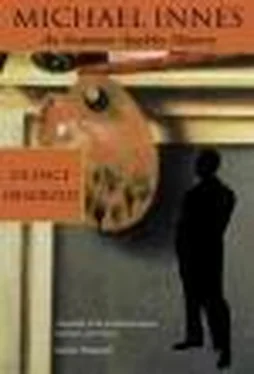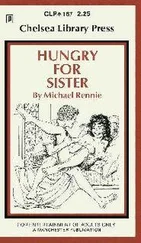Michael Innes - Lament for a Maker
Здесь есть возможность читать онлайн «Michael Innes - Lament for a Maker» весь текст электронной книги совершенно бесплатно (целиком полную версию без сокращений). В некоторых случаях можно слушать аудио, скачать через торрент в формате fb2 и присутствует краткое содержание. Жанр: Старинная литература, на английском языке. Описание произведения, (предисловие) а так же отзывы посетителей доступны на портале библиотеки ЛибКат.
- Название:Lament for a Maker
- Автор:
- Жанр:
- Год:неизвестен
- ISBN:нет данных
- Рейтинг книги:4 / 5. Голосов: 1
-
Избранное:Добавить в избранное
- Отзывы:
-
Ваша оценка:
- 80
- 1
- 2
- 3
- 4
- 5
Lament for a Maker: краткое содержание, описание и аннотация
Предлагаем к чтению аннотацию, описание, краткое содержание или предисловие (зависит от того, что написал сам автор книги «Lament for a Maker»). Если вы не нашли необходимую информацию о книге — напишите в комментариях, мы постараемся отыскать её.
Lament for a Maker — читать онлайн бесплатно полную книгу (весь текст) целиком
Ниже представлен текст книги, разбитый по страницам. Система сохранения места последней прочитанной страницы, позволяет с удобством читать онлайн бесплатно книгу «Lament for a Maker», без необходимости каждый раз заново искать на чём Вы остановились. Поставьте закладку, и сможете в любой момент перейти на страницу, на которой закончили чтение.
Интервал:
Закладка:
It seemed to be Lucifer’s wish to bide as lone as might be on that bad eminence. A week went by and folk were wondering whom he’d put in at the farm in the stead of Gamley, and when nothing happened they wondered if maybe he could get none to thole the thought of such a fee, for the Gamleys had laboured right hard tearing up that tough land and all to put the silver in Guthrie’s pocket. But there was no news of the laird’s speiring round for a grieve; that made folk fell curious and then one day Will Saunders went to market at Dunwinnie and came back with the speak that Guthrie’s bit kye had been trucked there two–three days after the Gamleys left. It seemed clear there was to be no more tillage at Erchany; Will said that with the spring a shepherd would be fee’d and yet another bit land go back to the sheep. Soon, he said, there would be nothing left of old Scotland; only a pack of highland gillies to lick the dowps of a feckless grouse-raising gentry, that and a few million coarse Irish creatures starving on the Clyde.
Whatever was on Guthrie’s mind – and there were stories enough going round – the closing of the home farm made Erchany a strangely isolated place. For it had been ever a Gamley that brought down the gossip from the glen-head, and now there was none there on claiking terms with Kinkeig except wee Isa Murdoch. And presently Isa came away too; had she stayed much longer at the meikle house, she said, a fit mate she’d soon have been for Tammas himself. The old wives welcomed the quean, that day she came down from the castle with her bit tin box on her head, much as the faithful angels might have welcomed Abdiel, filling her up with tea until she looked five months bairned, and hanging on her words as if she were the first to bring news of a second Livingstone out of Africa. And, faith, her tale was like a keek at some remote and savage place.
It’s time I said a word about the household at Castle Erchany; unco it was in a dwelling that had once counted its retainers by the score. Ever since the Guthries came near to ruin through the Darien scheme the castle has been half desolate: in the eighteenth century the family scarce had silver to breech themselves, for their pride was as high as their debts and they would part with no acre of land. And when they rebuilded their fortunes in the early years of the Old Queen they were right slow to repoint their walls or replenish their gear – there being something of Ranald’s temper hereditary, maybe, to the stock. But always until Ranald came home from Australia and inherited, the lairds had lived in fair style, with steward and footmen and queans enough indoors, and whiles a chaplain forbye for the dinging a bit Latin into the heir and a bit Divinity into those that must be got decent within the Kirk. Ranald was the first that was fair miserly: on his coming he turned out the servants much as he was to turn out the Gamleys; most of the rooms he locked the door on, and where lock was wanting he drove in nails rather than send to Dunwinnie for the locksmith; no penny would he spend and no soul would he see, but lived lone and low like a mouse in a cathedral.
All that is old history, for it was in the year 1894 that Ranald Guthrie became laird of Erchany. But now at the time I’m writing of things weren’t much different. Mistress Menzies, her that had bred up Christine, had gone to her grave, poor gentle soul; in the family, if such you could call it, were but Christine and Guthrie; the Hardcastles, man and wife, had a wing of the house to themselves, Mistress Hardcastle doing any bittock work she couldn’t ring out of Isa Murdoch, the one servant; and sleeping in a barn and doing the fell mucky work was the daftie Tammas. It was no place for Isa, the great shabby, shadowy, echoing house deep in the lithe of the larch woods, her that was but seventeen and liking fine the Saturday bus to Dunwinnie, or a romp with the loons about the Kinkeig biggins in the gloaming. Folk wondered she hadn’t given her notice long since, some said it was because she was right fond of Christine and loath to leave her in so coarse a place, and some said it was the grown Gamley lads, that they had all the soft and fragrant carpeting of Erchany Forest for their sporting with the quean and didn’t fail to take advantage of it. But whether it was Christine or the Gamleys that kept Isa at the meikle house, none doubted her story that it was Guthrie himself that drove her away at last.
Most times it was little that Isa saw of the laird. Nigh all day he’d bide in his study high in the great tower and when he went out to dander through the woods or whiles fish the Drochet it would be down the long tower staircase that dropped past his own private rooms and out by a little postern door remote from the rest of the house, a door of which the key was ever in his pocket. Isa would see no more of him than a keek at meals, and that was maybe enough. Only once a week she was allowed up to his bedroom for the thoroughing of it and then she would hear him pacing the study above, murmuring verses, another’s or his own. For you must know that Guthrie was poet as well as scholar. Years ago he put out a book of poems, a slender thing in black and yellow covers that fair scunnered those who thought a Scottish laird’s poems would naturally take after Rabbie Burns. I was a younger man myself then, unwilling to admit that a sutor will do well if he but knows a few classics, and once a week I used to read what they were writing of the new books, over in the Dunwinnie Institute – ten miles there and ten back, and long before the Saturday bus. And there bides in my memory a review in one of the London papers that ended: Mr Guthrie cultivates the abyss . I thought cultivates an unjust word: the reviewer creature had confounded Guthrie with the many poets of that day who were but playing at damnation. Guthrie – I must have believed these many years back – was damned in good earnest. I was romantic, maybe.
But to return to Isa Murdoch. A glimpse at meals was all she saw of her master, and the murmur of his chanted verses was all she heard, until a bit after the Gamleys left. Then one day when she was sweeping the corridor outside Christine’s room – the schoolroom, they still called it – she turned round and saw Guthrie standing over her and glowering. It almost sent her clean skite at once, she said, she’d never met in with him about the house before and never before had his awful gowking eye fallen on her – Guthrie, as I’ve told, going ever about with his gaze fixed on the middle air. She saw the glint of gold in his eye, she said, there in the dusky, dusty corridor, and when his lips parted – Guthrie who had uttered fient the syllable to her in all her Erchany days – she expected to hear a spell that would undo her surely.
Guthrie said quietly: ‘Open the house.’
5
A strange day they had of it, Christine Mathers and Isa and the Hardcastle wife, opening up Castle Erchany. They forced back the lofty shutters on their rusted hinges and set the slant autumn sunlight feeling through the dirt and destruction of forty years, blight, mildew and rot, and cobwebs as big as in the transformation scene at a pantomime. Isa turned the key in a pair of doors she had never glimpsed before and found herself in a billiard room, the great swathed table looming like some monster in his shroud, or like a stretcher in a giants’ morgue. She went up and touched it, wondering and a bit feared, never the like had she seen before. And at her touch on the corner of the thing a mouldering pocket gave way and down fell a couple of balls with a crash to the floor and rolled into the darkness. Isa said she felt a real clutch of fear at her thrapple then; it was as if the great muffled mysterious thing had stirred to life as she put her hand to it. She ran out, crying for Miss Christine, and the next thing she knew she had nearly spitted herself on a sword; it was the laird had taken down a rusty claymore from the wall and was doitering about with it like mad Hamlet looking for King Claudius of Denmark. But this time Guthrie looked straight over Isa’s head as usual and muttered something about having such airs that folk might know you kept a sword upstairs – and, at that, upstairs he went, sword and all, and wasn’t seen again that forenoon.
Читать дальшеИнтервал:
Закладка:
Похожие книги на «Lament for a Maker»
Представляем Вашему вниманию похожие книги на «Lament for a Maker» списком для выбора. Мы отобрали схожую по названию и смыслу литературу в надежде предоставить читателям больше вариантов отыскать новые, интересные, ещё непрочитанные произведения.
Обсуждение, отзывы о книге «Lament for a Maker» и просто собственные мнения читателей. Оставьте ваши комментарии, напишите, что Вы думаете о произведении, его смысле или главных героях. Укажите что конкретно понравилось, а что нет, и почему Вы так считаете.











